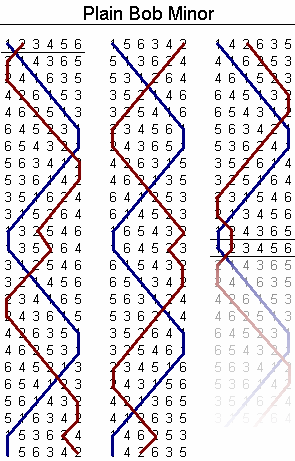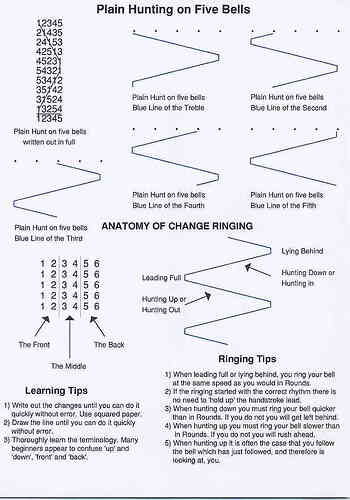First off, oh my gosh I’m so sorry for not realizing that! That’s great.
How how hard would it be to take the basic Plaint Hunt script and modify it to produce it’s more complex cousin, Plain Bob? There seems to me only one crucial difference that would need to be implemented to create this more complex pattern from the existing script, which is the “first pair stays, rest swaps” aspect:
Plain Bob:
[ 1, 2, 3, 4, 5, 6 ] - starts off like Plain Hunt i.e. “[ 1, 2, 3, 4, 5, 6 ].campanology(1);”
[ 2, 1, 4, 3, 6, 5 ]
[ 2, 4, 1, 6, 3, 5 ]
[ 4, 2, 6, 1, 5, 3 ]
[ 4, 6, 2, 5, 1, 3 ]
[ 6, 4, 5, 2, 3, 1 ]
[ 6, 5, 4, 3, 2, 1 ]
[ 5, 6, 3, 4, 1, 2 ]
[ 5, 3, 6, 1, 4, 2 ]
[ 3, 5, 1, 6, 2, 4 ]
[ 3, 1, 5, 2, 6, 4 ]
[ 1, 3, 2, 5, 4, 6 ] - where the current Plain Hunt script ends
[ 1, 3, 5, 2, 6, 4 ] - first pair stays, rest swap, then “[ 1, 3, 5, 2, 6, 4 ].campanology(1);”
[ 3, 2, 1, 4, 5, 6 ]
[ 2, 3, 4, 1, 6, 5 ]
[ 2, 4, 3, 6, 1, 5 ]
[ 4, 2, 6, 3, 5, 1 ]
[ 4, 6, 2, 5, 3, 1 ]
[ 6, 4, 5, 2, 1, 3 ]
[ 6, 5, 4, 1, 2, 3 ]
[ 5, 6, 1, 4, 3, 2 ]
[ 5, 1, 6, 3, 4, 2 ]
[ 1, 5, 3, 6, 2, 4 ]
[ 1, 5, 6, 3, 4, 2 ] - first pair stays, rest swap, then “[ 1, 5, 3, 6, 2, 4 ].campanology(1);”
[ 5, 1, 3, 6, 2, 4 ]
[ 5, 3, 1, 2, 6, 4 ]
[ 3, 5, 2, 1, 4, 6 ]
[ 3, 2, 5, 4, 1, 6 ]
[ 2, 3, 4, 5, 6, 1 ]
[ 2, 4, 3, 6, 5, 1 ]
[ 4, 2, 6, 3, 1, 5 ]
[ 4, 6, 2, 1, 3, 5 ]
[ 6, 4, 1, 2, 5, 3 ]
[ 6, 1, 4, 5, 2, 3 ]
[ 1, 6, 5, 4, 3, 2 ]
etc. etc.
Note this image focuses on the (2) bell’s direction change, but the above way of thinking produces the same result:


